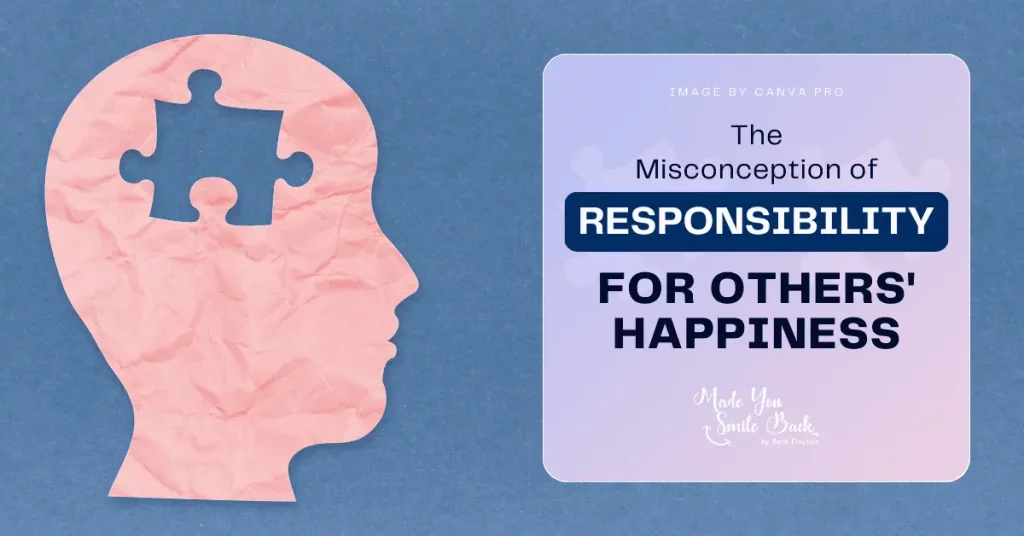You may have heard the phrase “you are responsible for your own happiness,” but what about the happiness of others? It’s common to feel like you need to make everyone around you happy, whether it’s your partner, friends, or family members. However, it’s important to remember that you are not responsible for other people’s happiness.
Trying to take responsibility for other people’s happiness can be exhausting and ultimately unfulfilling. You may find yourself constantly trying to please others, sacrificing your own needs and desires in the process. This can lead to feelings of resentment and burnout. Additionally, it’s not fair to put the burden of your own happiness on someone else. Ultimately, each person is responsible for their own emotional well-being.

Understanding & Taking Responsibility
Defining Responsibility
Responsibility refers to the duty or obligation to take care of something or someone. In the context of relationships, it means being accountable for your own actions and decisions, and not trying to control or take responsibility for someone else’s happiness. It’s important to understand that you are not responsible for other people’s emotions or well-being and that it’s not your job to fix their problems or make them happy.
Evaluating Your Needs
One of the key aspects of understanding responsibility is evaluating your own needs. It’s important to recognize that you have your own needs and desires, and that it’s okay to prioritize them. This doesn’t mean that you should be selfish or disregard other people’s feelings, but rather that you should take care of yourself first so that you can be in a better position to help others.
When evaluating your needs, it’s important to be honest with yourself and identify what truly matters to you. This could include things like your values, goals, and personal boundaries. By understanding your own needs, you can make better decisions and communicate more effectively with others.
Character
Understanding responsibility also requires having a strong sense of character. This means being honest, trustworthy, and reliable. It also means being willing to take ownership of your mistakes and learn from them. By being accountable for your own actions, you can build stronger relationships and earn the trust and respect of others.
In summary, understanding responsibility means recognizing that you are not responsible for other people’s happiness, evaluating your own needs, and having a strong sense of character. By taking ownership of your own actions and decisions, you can build healthier and more fulfilling relationships with others.

What is it Called When You Feel Guilty & Responsible for Others’ Happiness?
It is common to care about others and want them to be happy. However, when you feel responsible for other people’s happiness, it can lead to negative consequences for both you and the other person. This feeling is often referred to as “responsibility for others’ happiness” or “toxic guilt.”
- When you feel responsible for others’ happiness, you may put their needs and wants before your own, neglecting your own well-being. This can lead to feelings of resentment and burnout. Additionally, when you take responsibility for someone else’s happiness, you are essentially taking away their agency and autonomy to make their own choices and find their own happiness.
- This feeling can stem from a variety of sources, such as cultural expectations, family dynamics, or personal beliefs. It can also be a symptom of codependency, where you rely on others for your own sense of self-worth and validation.
- If you find yourself feeling responsible for others’ happiness, it is important to recognize that it is not your job to make them happy. You can support and care for them, but ultimately their happiness is their own responsibility. By acknowledging this, you can free yourself from the burden of responsibility and focus on your own well-being.
Related Posts:

The Misconception of Responsibility for Others’ Happiness
When it comes to happiness, there is a common misconception that you are responsible for other people’s happiness. This belief can create a lot of pressure and stress, leading to negative consequences for both you and the people you are trying to please.
The People-Pleasing Trap
One of the main reasons people feel responsible for others’ happiness is because they fall into the people-pleasing trap. This trap involves putting other people’s needs and desires above your own, often at the expense of your own well-being. While it’s important to be kind and considerate of others, constantly putting their happiness before your own can lead to feelings of resentment, burnout, and even depression.
The Blame Game
Another reason people feel responsible for others’ happiness is because they fear being blamed if something goes wrong. For example, if a loved one is unhappy, you may feel like it’s your fault and that you should have done something differently. However, this type of thinking is not only inaccurate but can also be harmful. It’s important to remember that everyone is responsible for their own happiness, and blaming others for your emotions only leads to a cycle of negativity and dissatisfaction.
It’s important to recognize that while you can certainly contribute to someone’s happiness, you are not solely responsible for it. Each person is responsible for their own emotions and well-being, and trying to take on the burden of others’ happiness can lead to negative consequences for everyone involved. By focusing on your own happiness and well-being, you can create a positive and fulfilling life for yourself, which in turn can have a positive impact on those around you.

Stop Trying to Fix Other People’s Problems
It’s natural to want to help others when they’re struggling, but it’s important to recognize that you can’t solve other people’s problems. It’s not your responsibility to fix everything in someone else’s life, and trying to do so can actually be harmful for both of you.
- First, it’s important to understand that everyone has their own journey and their own challenges to face. You can offer support and guidance, but ultimately it’s up to the individual to take action and make changes in their own life. You can’t force someone to change, and trying to do so often leads to frustration and resentment.
- Second, when you take on the responsibility of solving someone else’s problems, you’re actually taking away their power and agency. They may become dependent on you and feel helpless without your constant intervention. This can lead to a codependent relationship that is unhealthy for both parties.
- Third, it’s important to recognize that you have your own life and your own challenges to face. Focusing too much on someone else’s problems can take away from your own personal growth and development. Remember to prioritize your own well-being and set boundaries when necessary.
In summary, you can’t solve other people’s problems. It’s important to offer support and guidance, but ultimately it’s up to the individual to make changes in their own life. Taking on too much responsibility can be harmful for both parties and can lead to a codependent relationship. Remember to prioritize your own well-being and set boundaries when necessary.

3 Steps on How To Stop Feeling Responsible For Other People’s Happiness
Feeling responsible for other people’s happiness can be a heavy burden to bear. It can cause anxiety, stress, and even depression. However, it’s important to remember that you are not responsible for other people’s happiness. Here are some steps you can take to stop feeling responsible for other people’s happiness:
1. Set Boundaries
Setting boundaries is an important step in stopping the cycle of feeling responsible for other people’s happiness. You need to be clear about what you are willing and able to do for others. This means saying “no” when you need to, and not feeling guilty about it. It’s important to remember that you have your own needs and limitations, and it’s okay to prioritize them.
2. Focus On Yourself
It’s easy to get caught up in trying to make others happy, but it’s important to remember to focus on yourself as well. Take time for self-care, hobbies, and activities that bring you joy. Remember that you are just as important as anyone else, and your happiness matters too.
3. Practice Mindfulness
Mindfulness can be a powerful tool in breaking the cycle of feeling responsible for other people’s happiness. It can help you to stay present in the moment, and not get caught up in worrying about the future or feeling guilty about the past. Try practicing mindfulness meditation, or simply taking a few deep breaths when you start to feel overwhelmed.
4. Seek Support
If you’re struggling to stop feeling responsible for other people’s happiness, it can be helpful to seek support from a therapist or counselor. They can help you to identify and address the underlying issues that are causing you to feel this way, and provide you with tools and strategies to break the cycle.
Remember, you are not responsible for other people’s happiness. By setting boundaries, focusing on yourself, practicing mindfulness, and seeking support, you can break the cycle and start living a happier, healthier life.

Conclusion – Final Thoughts
In conclusion, it is important to remember that you are not responsible for other people’s happiness. While it is natural to want to help those around you, it is essential to recognize that you cannot control the emotions and actions of others. Happiness is a personal responsibility that each individual must take on for themselves.
It is important to focus on your own happiness and well-being before attempting to help others. By taking care of yourself and addressing your own needs, you will be better equipped to support those around you. This can include engaging in self-care activities, setting boundaries, and seeking support from friends, family, or a mental health professional.
Remember that the universe is vast and complex, and there are many factors that contribute to a person’s happiness. While you may pray for the happiness of others, it is important to recognize that you cannot control the outcome of their lives. Instead, focus on being a positive influence in their lives and providing support when needed.
In summary, while it is important to be kind and compassionate towards others, it is not your responsibility to make them happy. Focus on your own happiness and well-being, and be a supportive presence in the lives of those around you.




